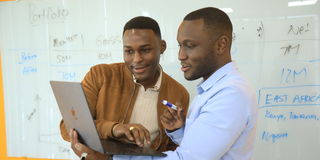Prime
Meet the Usiri brothers: Tanzanians building a billion-dollar fintech

Ramani co-founders Iain Usiri (left) and Calvin Usiri
What you need to know:
- Iain Usiri, 31, and Calvin Usiri, 28, have built a financial technology company called Ramani, headquartered in Dar es Salaam.
A generation of intelligent Tanzanian youth is rising, one that is changing the narrative and changing the business landscape across multiple fields.
One such example is the dynamic duo of Iain and Calvin Usiri, two brothers who are steadily transforming Tanzania's trade industry by leveraging technology and re-engineering financial infrastructure for Africa’s supply chains through a company they founded in their 20s.
Iain Usiri, 31, and Calvin Usiri, 28, have built a financial technology company called Ramani, headquartered in Dar es Salaam.
Ramani uses technology to finance the inventory of category-leading brands in the fast-moving consumer goods industry. They have formed a cloud network of third-party micro-distribution centres for Africa's trillion-dollar consumer packaged goods (CPGs) supply chain.
Ramani as a business was conceived when the two brothers, along with a third co-founder, Kibet Martin, were still in college in the US.
Iain, who serves as the Chief Executive Officer of the company, took the first initiative in 2019 when he decided to quit his job in the US and move back to Tanzania to set the foundation for Ramani, much to the dismay of his parents. Calvin, the Chief Technology Officer, who has a background in computer science and economics, and Kibet, the Chief Operating Officer and a financial expert, followed suit a few months later.
Before establishing Ramani, Iain and Calvin tried their hands at a few disruptive startups.
"We have always wanted to become entrepreneurs, and we actually both tried to start companies while we were still at the university," Iain reveals.
He says that the entrepreneurial path has always been the one that they would eventually take.
In 2015, Iain co-founded Verbatm, a company centred on empowering citizen journalism, in San Francisco, US. Together with his partners at that time, they managed to raise some venture capital for the company and were able to build a team. "Those were the early days, but we did manage to get it off the ground," he says.
When the business went under, Iain managed to retain the investors, who have now also invested in Ramani.
This experience, which happened when Iain was graduating from Stanford University, was the stepping stone to a more illustrious journey into the startup universe.
In 2017, Iain's younger brother, Calvin, who was 20 years old, co-founded a venture that built an engine to track arbitrage across different crypto exchanges; this ultimately led him to Africa—Zimbabwe, to be precise.
"There was a big pull towards Zimbabwe at that time due to the different mediums of exchange that they had," Calvin shares, adding that he had asked his mother for $5,000 in seed capital for the business. "She thought about it, but part of it meant that I had to drop out of school, so as most African parents would do in such a situation, she completely said no," shares Calvin, who was this year named among Africa's Forbes 30 Under 30 class of 2024 due to his work at Ramani and in the tech ecosystem.
Throughout this period of trial and error for the ambitious duo, they always kept in touch, even though they lived and worked in different states in the US. "Calvin would always fly into California, and we would brainstorm on what companies to start," Iain shares.
In 2019, they finally decided to build a company, and they also made a deliberate decision to start the company in Tanzania. "We decided that if we are successful, it would mean a lot more to us if we are successful here [Tanzania]," Iain says, adding that at the age of 26 and his brother 22, they might not have been old enough to know any better, but it is that drive and ambition that led them to build what is now a thriving business.
Iain and Calvin didn't sail alone; as they were traversing uncharted waters, they had mentors who guided them along the way, introduced them to some business models, and taught them to communicate in the corporate world.
"Having a mentor isn't a panacea that is going to help you become successful, but it does make a difference," Iain says.
Following in his brother's footsteps
Calvin's decision to join his brother in Tanzania to build a business was informed by calculated risk and regret minimization. "I saw this as smart risk, which I classify as something with the potential to have significant upside with minimum downside," Calvin says, adding, "I looked at the variables when I went into it: I was young, my parents were healthy and still employed, and I had the opportunity to go back to school if I wanted to or go back to my previous employer. If you look at the output there, there's a reasonably small risk."

On regret minimization, Calvin says he wants to reach 60 or 70 years old without regretting anything. "I felt that if I was going to regret not coming back to Tanzania to build something in an environment that I didn't know much about, then I would do it. If I wasn't going to regret it, then I wouldn't do it," he shares.
The two brothers moved back to Tanzania to face an environment characterized by reforms, a constant transition in the business space, and an underdeveloped environment for startups. Despite the odds stacked against them, they made the move regardless.
"You would think that two engineers looked at the KPIs and the macroeconomic environment and made a strategic decision; it wasn't like that at all. It was definitely a decision made from the heart, and I won't pretend otherwise. We came back and trusted our skillset. We are two software engineers who worked for top companies in the US, so we knew how to code, program, and build whatever we needed," Iain shares.
They also had savings of $70,000, which they used to lay the groundwork for the company.
The American dream is built around the concept of people from around the world finding success in the US. For Iain and Calvin, they took the opposite route. "When I was leaving the States, one of my very close friends and one of the smartest people I know said to me, Iain, people don't leave America to start a business; they move to America to start a business. That really hit home when he said it. He is 100 percent right, but we were driven by something more, and that is what has pushed us to where we are," Iain says.
Ramani's success didn't happen overnight; as explained by the two co-founders, the company had to pivot three times before finding a service that stuck. "To shut down and rise up again, your technology has to be built in a way where you can quickly reconfigure and relaunch," says the CEO.
They credit part of their current success to the guidance of a former Chai Bora Managing Director, who made time to take them through the ropes. "It is rare for those senior people who are decision-makers to make time for struggling entrepreneurs in their 20s," Iain says, adding that it is through those guidance and pitching sessions with the veteran executive that they came to understand that the inability of distributors to purchase from brands impacts the brands and their ability to capture market share and grow.
This challenge presented an opportunity for the brothers, who saw that it was an incentive for brands if the distributors had purchasing power, and that is how they leveraged the situation and came up with a solution.
The close bond and blood tie that Iain and Calvin share have enabled them to steer their ship forward. However, misunderstanding, which is common among siblings, is something that they have managed to deal with as business partners.
"The core foundation of any functioning and winning team is trust. There's an interesting book that I would recommend: The Five Dysfunctions of a Team, by Patrick Lencioni. It was recommended to us by one of our advisors. It teaches how to build winning teams and identifies common dysfunctions. It starts with trust, which then leads to healthy conflict. So, Iain and I will disagree on many things, but because we have trust and our responsibilities to manage our roles, it leads to healthy conflict where we hear each other out, and then we eventually commit to a path, which is followed by accountability and results," Calvin explains.
Despite being in operation for five years, Iain reveals that Ramani hasn't broken even. "If we want to break even, we can break even tomorrow by simply cutting our costs and stopping investing. But our objective right now is to scale. We are investing in the team and the infrastructure. We want to hit certain revenue milestones," Iain explains.
The two brothers and their third co-founder, Kibet, have created a synergy that is changing the business landscape as they lead a team of over 80 people.
They now say that their parents, who were sceptical about the idea of them leaving the US and relocating to Tanzania to chase a dream, can now retire happy.




